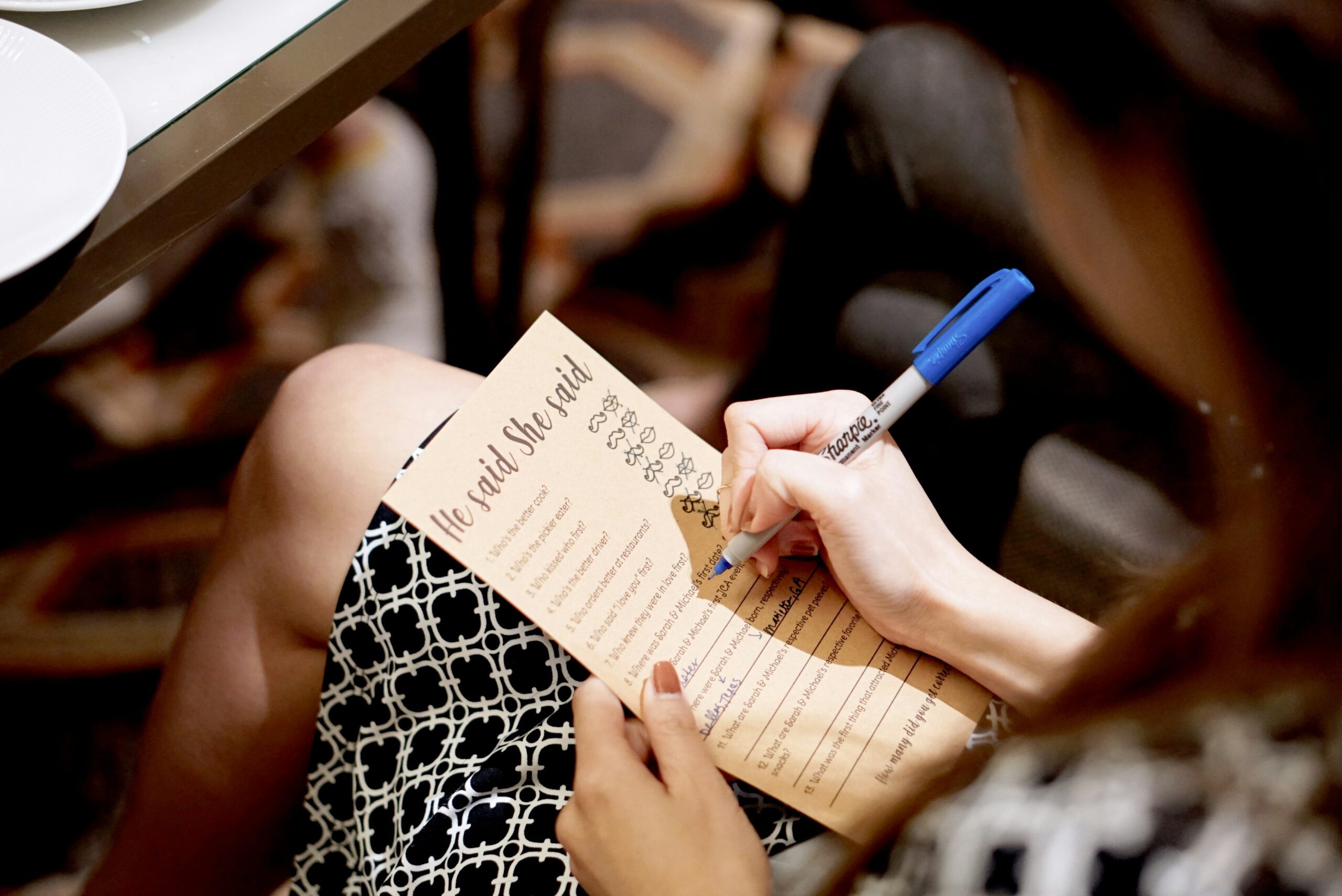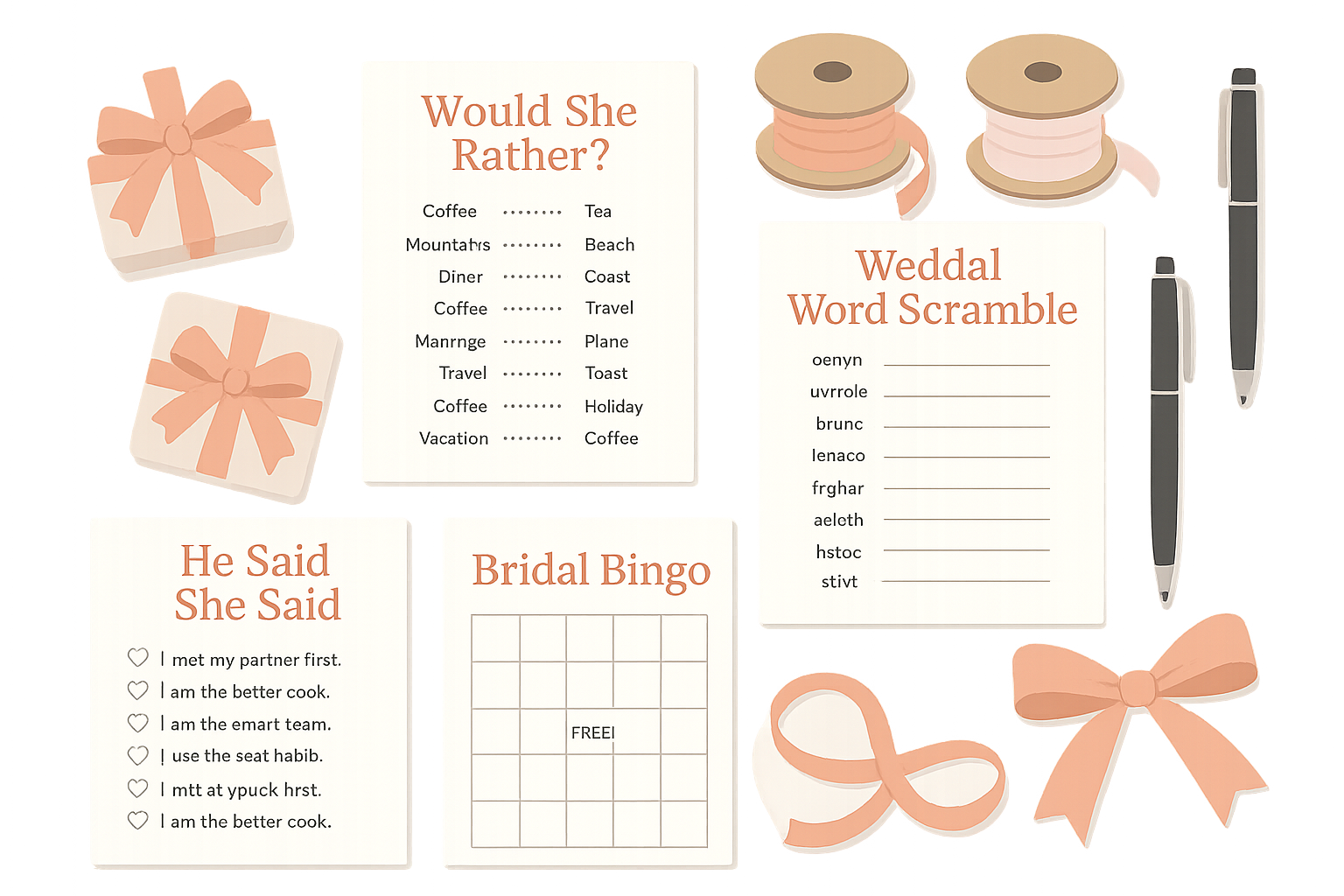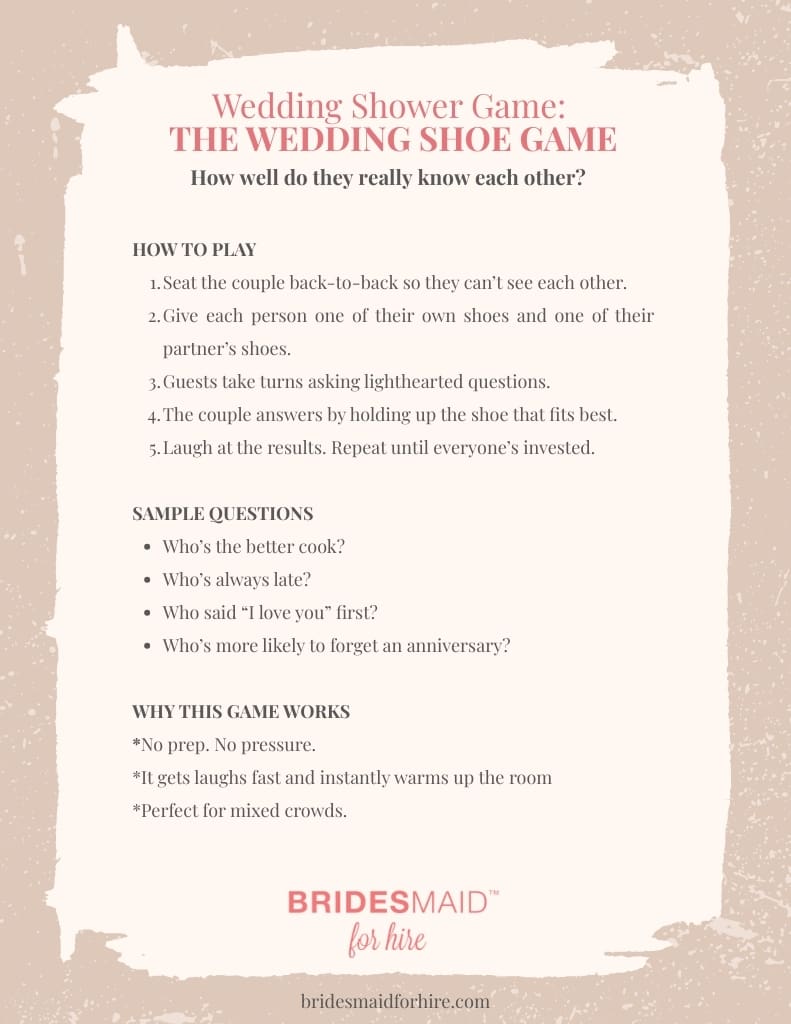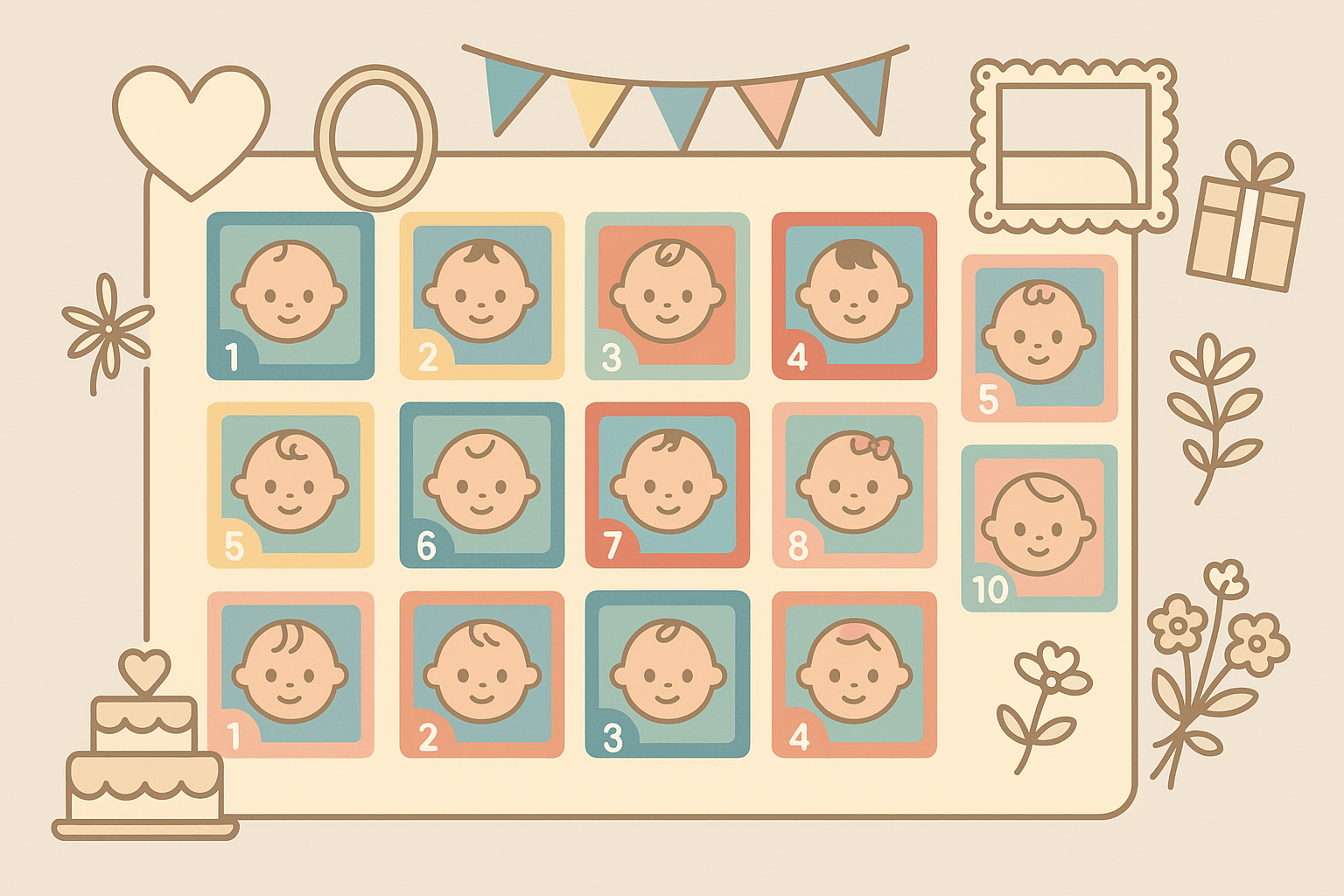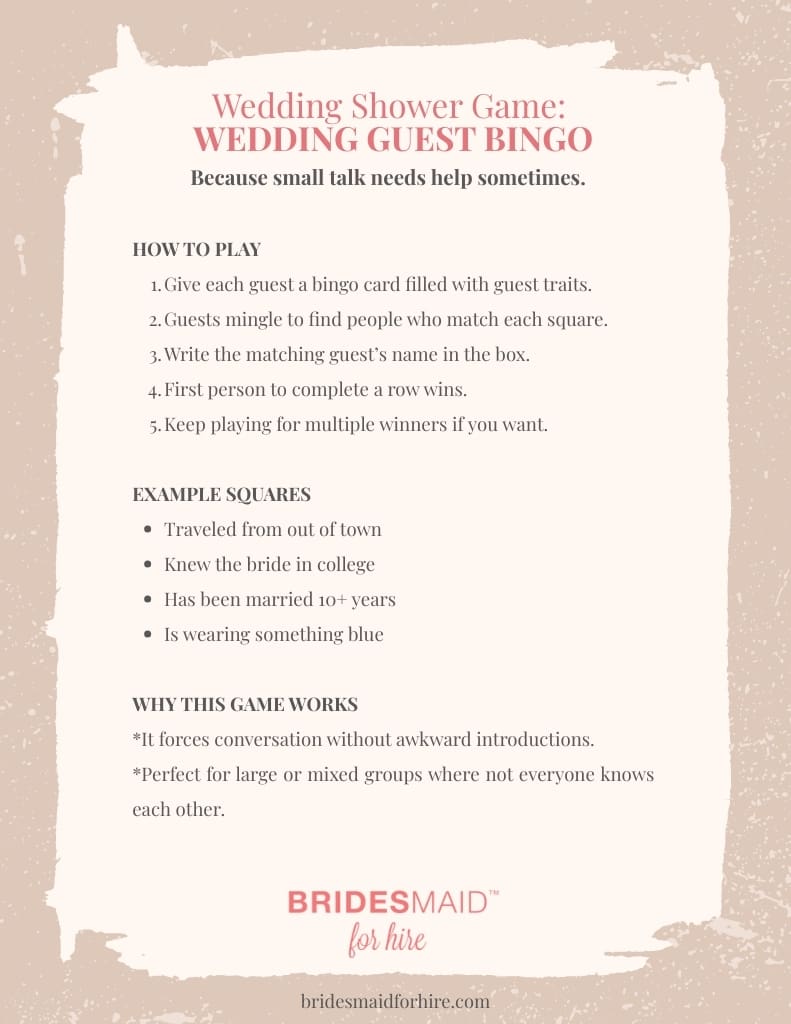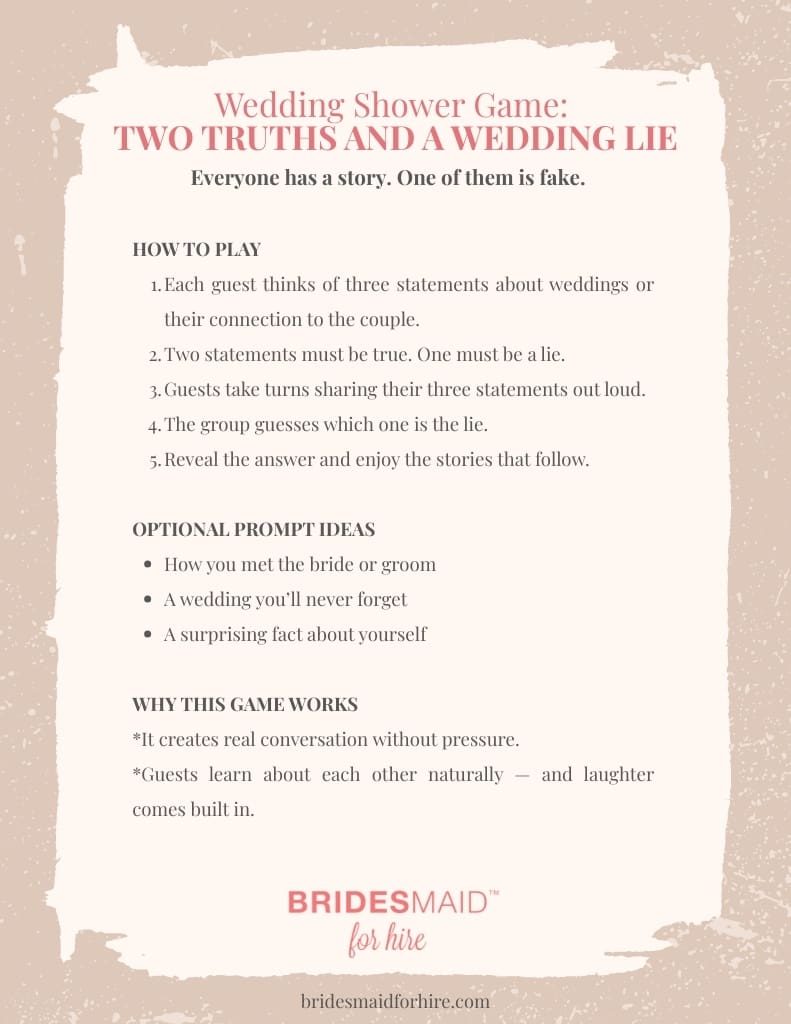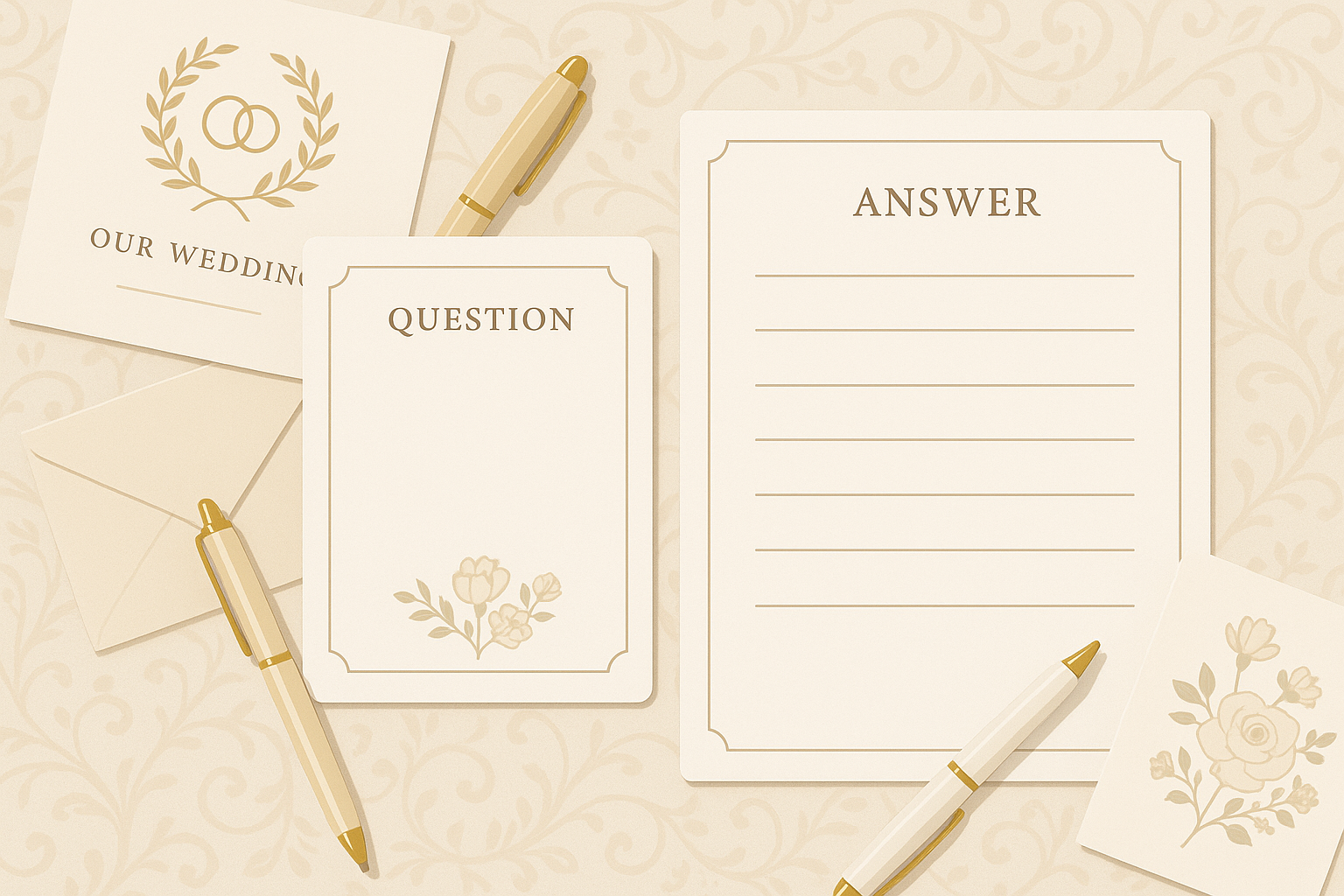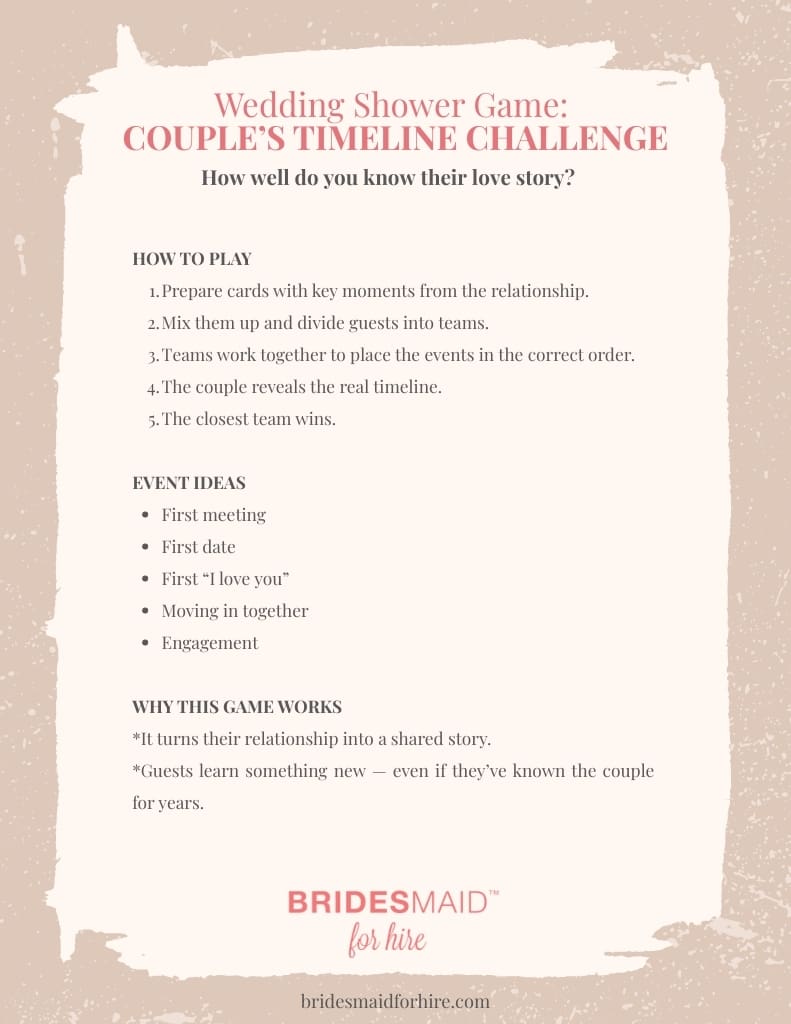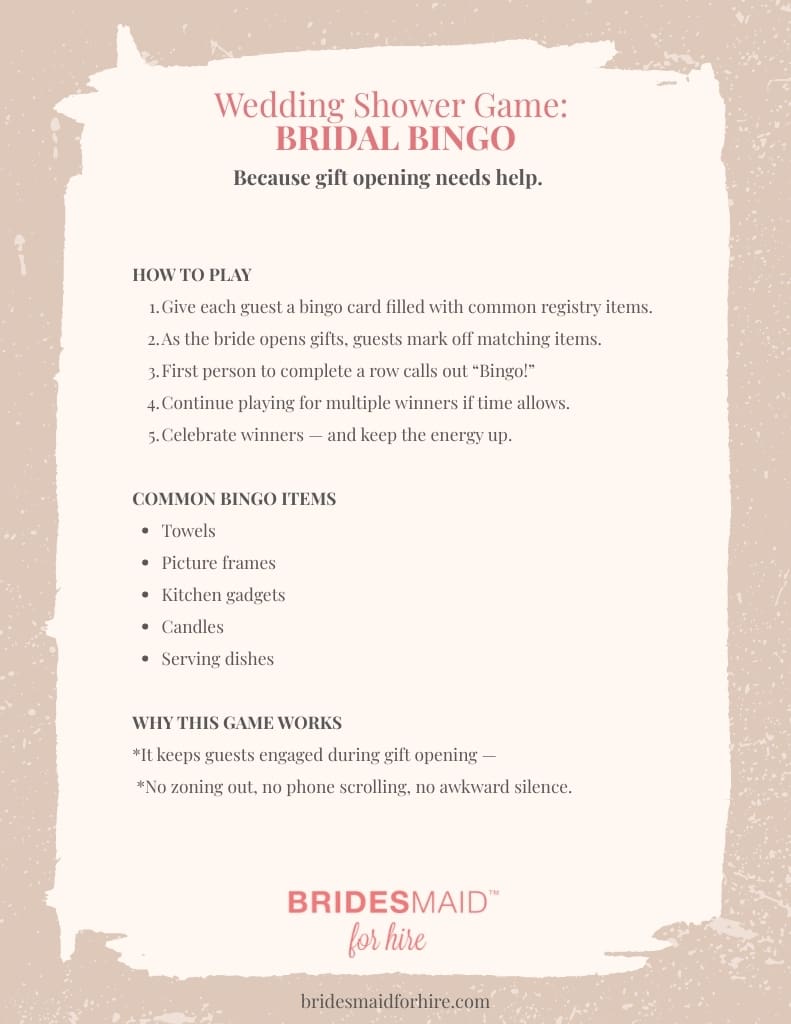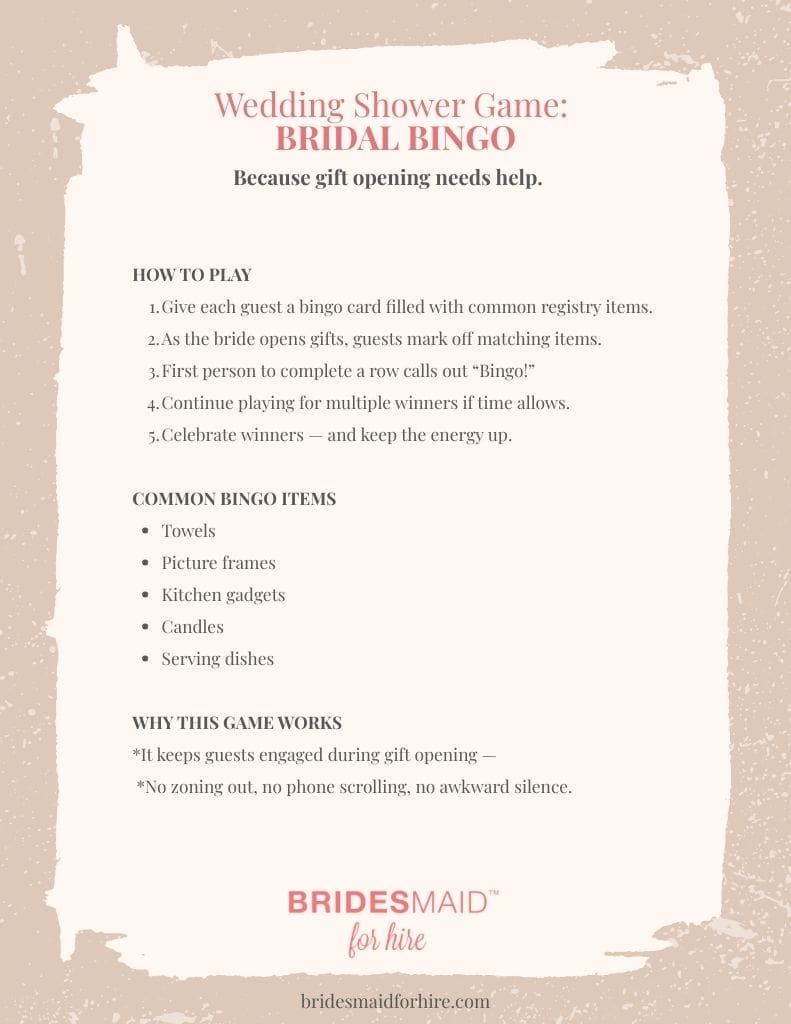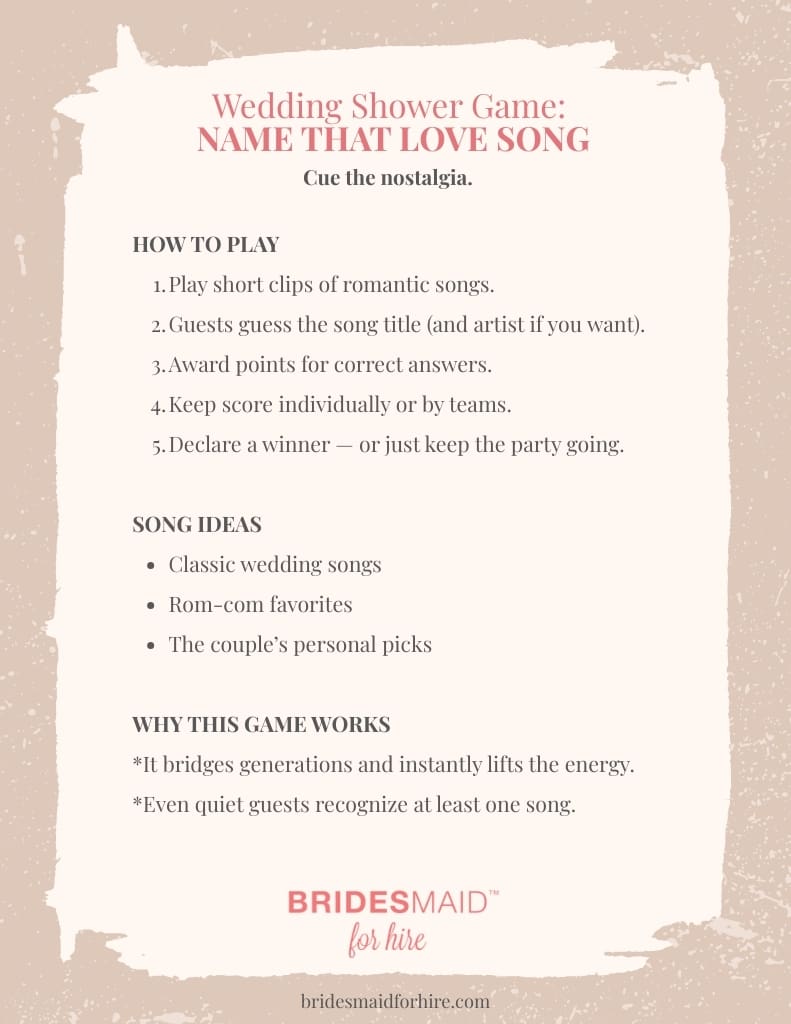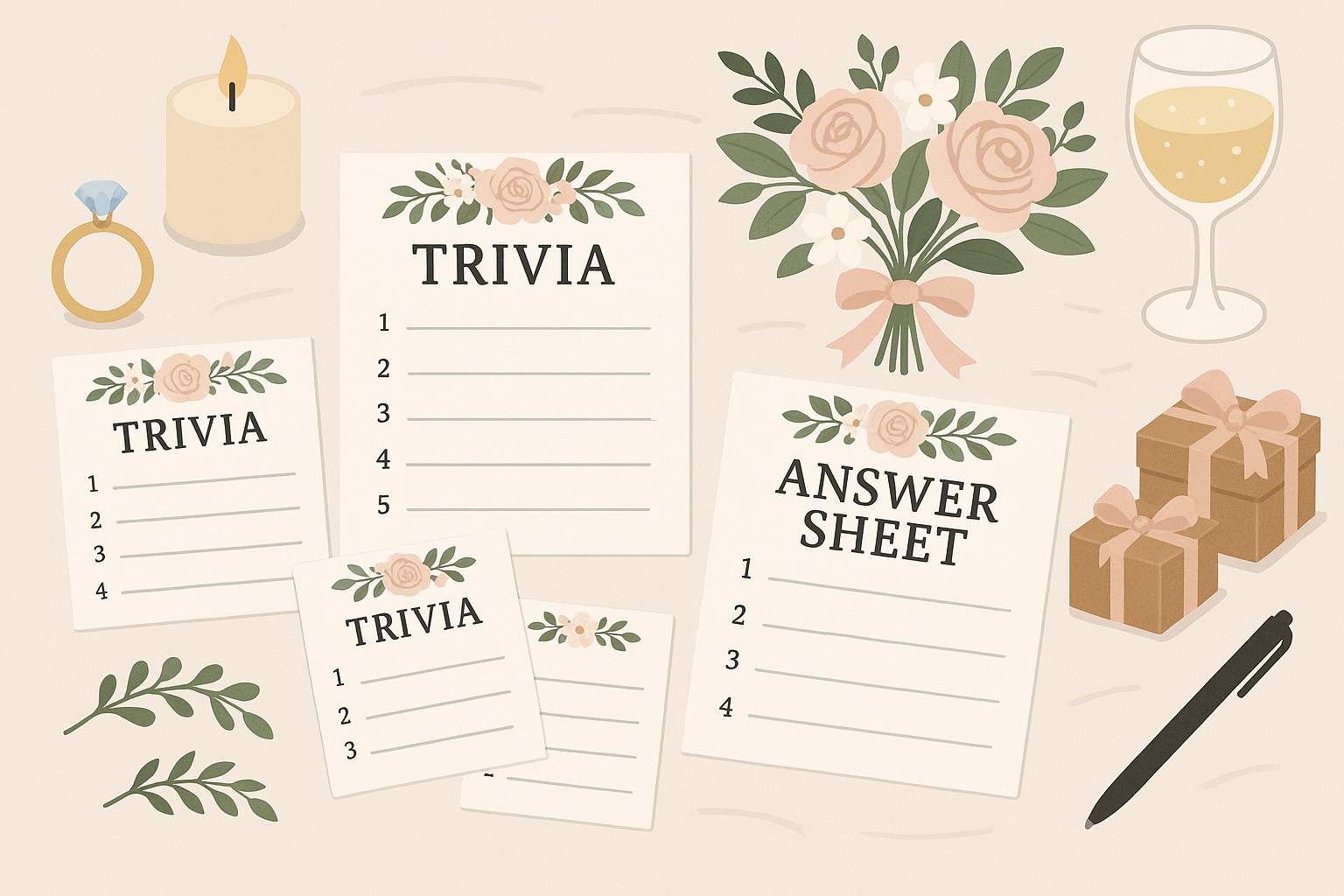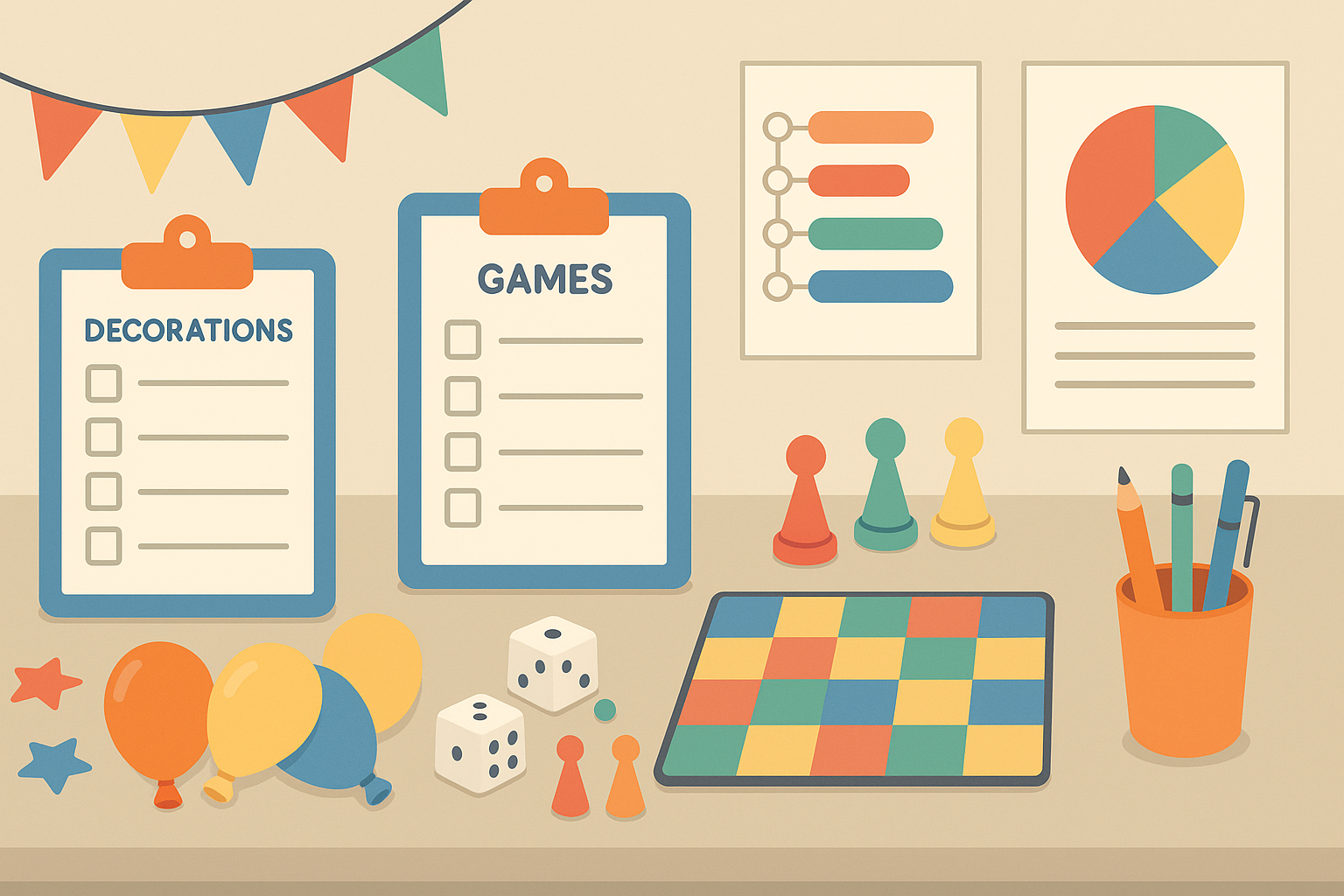I’ll never forget my cousin’s bridal shower where we played the same tired games everyone does. By the third round of “guess the bride’s favorite color,” half the guests were sneaking peeks at their phones. That’s when I realized most shower games are just… not great.
According to WeddingWire forum discussions, most hosts plan 3 games for their wedding showers, but honestly? I’ve been to way too many showers where those three games fell flatter than a deflated balloon. You know the feeling – watching guests politely participate while secretly checking their phones under the table.
We’ve all been there – sitting in a circle playing some weird toilet paper game while internally cringing. Or watching the bride’s face as she pretends to love opening her fifteenth kitchen towel set. That’s exactly why I’ve put together this go-to list of 25 wedding shower games that actually work.
Planning a memorable wedding shower means choosing fun bridal shower games that bring people together rather than making them squirm in their seats. The right games can transform an awkward gathering of strangers into a celebration where everyone’s genuinely having fun and creating lasting memories with the happy couple.
TL;DR
- Think about who’s actually coming before picking games – grandmas and college friends need different entertainment
- Mix it up to keep energy balanced – don’t do five trivia games in a row (learned that one the hard way)
- Start with icebreakers when people are still awkward and settling in
- Couple-focused games create those “aww” moments everyone remembers
- DIY activities are perfect for crafty crowds and make great photo ops
- Active games need space and willing participants – know your audience
- Competitive games work when people actually know the couple well
- Getting help isn’t cheating – sometimes you just need someone else to worry about the details
Why Most Wedding Shower Games Fail (And How to Pick Winners)
Here’s what I’ve learned after attending way too many showers: most wedding shower games bomb because hosts think “what sounds fun” instead of “what will actually work for this specific group.” I’ve watched beautifully planned showers turn awkward when the games didn’t match the crowd.
Your guest list tells you everything you need to know. A group of college sorority sisters will embrace silly, high-energy activities that would make a mixed crowd of grandparents and coworkers cringe. Think about comfort levels with personal questions, physical activities, and competitive elements when planning your bridal shower activities.
Planning the perfect celebration requires thoughtful consideration of bridal shower planning basics that ensure every guest feels included and entertained.
Okay, real talk about guest types – if you’ve got grandmas and college friends in the same room, skip the drinking games and anything that involves getting too personal. Stick with safe bets like wedding bingo or the shoe game. But if it’s just your sorority sisters? Go wild.
| Guest Type | Games That Work | Skip These |
|---|---|---|
| Mixed Age Groups (20s-70s) | Wedding Shoe Game, Baby Photo Matching, Purse Scavenger Hunt | Physical relay races, Intimate trivia, Dance competitions |
| Close Friends Only | Two Truths and a Lie, Couple’s Timeline, Personal trivia | Basic icebreakers, Generic activities |
| Family-Heavy Groups | Memory games, Advice cards, Photo activities | Drinking games, Adult humor, Overly competitive games |
| Coworker/Acquaintance Mix | Wedding Bingo, Tradition trivia, General knowledge games | Personal relationship questions, Inside jokes |
Space matters more than you’d think. I once tried to plan active games in my tiny apartment – let’s just say watching eight people attempt charades in a living room barely big enough for a couch was… an experience. Small spaces need seated activities, while bigger venues give you flexibility for movement-based fun.
And let’s be honest – you’re probably already stressed about the food, decorations, and making sure Great Aunt Martha doesn’t corner the bride about having babies. The last thing you need is games that require tons of prep or expensive supplies.
Group size changes everything too. Large gatherings (20+ people) need games that work with teams or let everyone participate at once. Intimate groups (8-12 people) can handle more personal, detailed activities where everyone gets individual attention.
The couple’s personality should guide your choices – some love being the center of attention, others prefer staying in the background. I learned this when I planned a spotlight-heavy game for my super shy friend. Poor girl looked like she wanted to disappear into the floor.
Don’t forget about inclusivity. The best bridal shower games work for everyone, whether they’ve known the bride since kindergarten or just met her at the engagement party.
Getting-to-Know-You Games That Break the Ice Without Breaking Spirits
These five icebreaker games help guests connect naturally while learning about each other and the couple. They’re perfect for when people are still settling in and need a little encouragement to mingle – no forced awkwardness required.
1. Wedding Shoe Game
The couple sits back-to-back, each holding one of their shoes and one of their partner’s. Guests ask questions like “Who’s the better cook?” or “Who takes longer to get ready?” and the couple raises the appropriate shoe to answer.
This game is genius because it puts the couple in the spotlight while revealing hilarious insights about their relationship. Everyone gets to participate by asking questions, and the answers often surprise even close friends and family. Plus, zero prep work required – just grab some shoes and go.
For more entertaining question ideas, check out these wedding shoe game questions that guarantee laughs and memorable moments.
At Sarah’s bridal shower, the Wedding Shoe Game revealed that despite being together for five years, most guests didn’t know that Sarah’s fiancé Mike was actually the tidier one. When asked “Who’s more organized?” and Mike’s shoe went up, even Sarah’s mother gasped in surprise. This led to a hilarious 10-minute discussion about Mike’s color-coded closet system, with guests sharing their own organization tips and relationship quirks.
The magic happens in how it naturally creates follow-up conversations. When the bride raises her shoe for “better driver,” guests inevitably start sharing their own driving horror stories during the next activity.
2. Guess the Guest Baby Photos
Collect baby photos from all attendees in advance and display them numbered on a board. Guests try to match photos to the correct person, creating instant conversation starters and lots of laughter.
This classic works because it gives everyone something to talk about while moving around the room. People naturally cluster around the photo display, comparing guesses and sharing stories about those adorable (or embarrassing) baby pictures. These bridal games create natural bonding moments without forcing it.
The key is getting photos in advance – send requests with invitations and follow up with stragglers. Trust me, there’s always someone who forgets until the last minute. Digital photos work fine; just print them at consistent sizes for the best display.
3. Wedding Guest Bingo
Create bingo cards with characteristics like “Has been married over 20 years,” “Traveled from out of state,” or “Knew the bride in college.” Guests mingle to find people matching each square and write their names in the appropriate spaces.
This game forces interaction in the best possible way. Shy guests have a built-in conversation starter, while social butterflies get to work the room efficiently. It’s perfect for large groups where many people don’t know each other, making it one of the most effective fun bridal shower games for mixed crowds.
Looking for more interactive options? Explore these wedding bingo variations that keep guests engaged throughout the entire celebration.
Customize squares to reflect your actual guest list. If half the attendees are college friends, include more specific categories like “Lived in the same dorm” or “Was in the same sorority.” Make it relevant to your crowd.
4. Two Truths and a Wedding Lie
Each guest shares three statements about their relationship with the couple or wedding experiences – two true, one false. Others guess the lie, creating personal connections and revealing interesting stories.
This works best with smaller groups where everyone can participate meaningfully. It’s particularly effective when guests have varied relationships with the couple, from childhood friends to new coworkers. These bridal games encourage storytelling and genuine connection.
The stories that emerge often become the most memorable part of the shower. You’ll learn about secret crushes, funny first impressions, and touching moments that even the couple might not know about. Plus, everyone loves trying to spot the lie.
5. Find Your Match
Write famous couples’ names on name tags, giving each guest half of a couple. Guests must find their “match” and learn three things about that person before the next activity begins.
Include a mix of real and fictional couples across different eras – Romeo & Juliet, Barack & Michelle Obama, Ross & Rachel, Beyoncé & Jay-Z. This ensures everyone recognizes at least some of the references and nobody feels left out.
The three-question requirement prevents superficial interactions. Guests actually have to have real conversations rather than just finding their match and immediately wandering off to the snack table.
Couple-Focused Games That Celebrate Love Stories
These five games put the spotlight on the happy couple while helping guests learn more about their relationship journey. They create those “aww” moments everyone remembers and often produce keepsakes the couple will treasure long after the shower ends.
6. How Well Do You Know the Couple?
Create a detailed questionnaire about the couple’s relationship, preferences, and history. Include questions ranging from easy (“What’s the bride’s favorite color?”) to challenging (“Where did they go on their third date?”).
The magic happens when you reveal the answers. Guests discover surprising details about the couple, and even close friends learn new things. It sparks conversations about shared experiences and creates opportunities for storytelling. This is one of the most engaging couples wedding shower games for mixed groups.
Mix up the difficulty levels to keep everyone engaged. Include some questions that only family members would know alongside others that casual friends can answer based on social media or general knowledge. Nobody should feel completely lost.
7. Couple’s Timeline Challenge
Present major events in the couple’s relationship out of order. Guests work in teams to arrange them chronologically, from first meeting through engagement and beyond.
This wedding bridal shower games option educates guests about the couple’s journey while encouraging teamwork and discussion. Teams naturally start sharing their own relationship stories while debating the correct order of events. It’s like relationship history class, but actually fun.
Include 15-20 events for the right level of challenge. Mix obvious milestones (first date, engagement) with more subtle moments (first “I love you,” meeting the parents, moving in together). The variety keeps teams guessing.
8. Wedding Predictions and Advice
Guests fill out cards predicting the couple’s future and offering marriage advice. Create categories like “Number of children,” “Dream vacation destination,” and “Biggest challenge they’ll face together.”
The predictions become a beautiful keepsake for the couple to read on their first anniversary. Some guests take it seriously, others get creative, but everyone enjoys hearing the variety of responses when you share highlights. It’s like a time capsule of well-wishes.
Provide quality cards and pens since this becomes a permanent memento. Consider creating a small book or scrapbook to present the completed predictions in an organized, lasting format that won’t get lost in the wedding chaos.
At Jennifer’s shower, the prediction cards created unexpected moments of wisdom and humor. While most guests predicted 2-3 children, Jennifer’s 85-year-old grandmother wrote “As many as your hearts can hold – children, pets, or plants!” Her marriage advice card read: “Dance in the kitchen every Sunday morning, even if there’s no music.” The couple later said this became their favorite tradition, and they still have that card framed in their kitchen five years later.
9. Love Story Mad Libs
Create a mad libs template about the couple’s relationship, asking guests to fill in adjectives, nouns, and verbs without knowing the story. Read the hilarious results aloud for guaranteed laughter.
This game works because it’s impossible to predict the outcome. Even the most serious guests end up giggling when their random words create absurd versions of the couple’s love story. It’s pure comedy gold every single time.
Write the template to include key moments from their actual relationship. The funnier the random insertions make the real story, the more memorable the experience becomes. Plus, you’ll have everyone in stitches.
10. Couple’s Superlatives
Guests vote on categories like “Most likely to get lost,” “Better driver,” or “Morning person vs. night owl.” Reveal the answers the couple provided in advance to see how well guests know them.
The entertainment comes from comparing guest perceptions with reality. Sometimes the results surprise everyone, including the couple themselves when they see how others view their relationship dynamics. It’s fascinating and funny.
Include both serious and silly categories. Mix practical questions (“Who handles the finances?”) with fun ones (“Who would survive longer on a desert island?”). The variety keeps everyone engaged and laughing.
Creative DIY Activities That Double as Keepsakes
These five hands-on activities engage guests’ creativity while producing tangible mementos for the couple . They’re perfect for crafty crowds and create excellent photo opportunities throughout the process – plus everyone loves making something they can actually keep.
11. Design the Wedding Dress
Provide teams with toilet paper, tape, and ribbon to design wedding dresses on volunteer models. Set a time limit and have the bride judge the creations in categories like “Most Creative” and “Most Likely to Actually Wear.”
This classic never fails because it’s inherently hilarious. Watching serious adults struggle with toilet paper engineering while their “model” tries not to move creates comedy gold and unforgettable photos. It’s one of the most popular bridal shower game ideas for good reason.
Fair warning though – it gets MESSY. Like, you’ll be finding bits of toilet paper in your couch cushions for weeks. Also, someone always gets way too into it and starts treating it like Project Runway. Just saying.
Success depends on having willing models and adequate space for teams to work. Provide scissors, safety pins for emergencies, and designate a “runway” area for the final fashion show. The catwalk moment is half the fun.
12. Marriage Advice Recipe Cards
Guests create “recipe cards” for a happy marriage using cooking terminology. For example: “Mix 2 cups of laughter with 1 tablespoon of patience. Bake with love for a lifetime.”
This activity appeals to all ages and creates a meaningful keepsake the couple will actually use. The cooking metaphor makes it easy for even non-writers to participate creatively. This unique bridal shower games approach combines creativity with sentiment perfectly.
Provide high-quality recipe cards and fine-tip pens since this becomes a permanent memento. Include a few examples to get creative juices flowing, but let guests develop their own unique “recipes.” The results are always surprising and sweet.
13. Wedding Hashtag Challenge
Divide guests into teams to create the most creative wedding hashtag for the couple. Consider their names, interests, wedding details, and personalities in developing options.
This modern twist provides real practical value – the couple might actually use the winning hashtag for their wedding. It appeals to social media-savvy guests while giving everyone a chance to be clever with wordplay. Plus, it’s actually useful.
Set parameters around appropriateness and length limits for actual social media use. The couple chooses the winner, but consider having guests vote for a “People’s Choice” award as well. Democracy in action.
14. Purse Raid Scavenger Hunt
Create a list of items commonly found in purses with different point values. Guests search their bags for items like lip balm (1 point ), hand sanitizer (2 points), or receipts from today (3 points).
The purse scavenger hunt is genius because literally zero prep work. I discovered this when I completely forgot to plan games until an hour before the party. Panic planning for the win!
| Item | Point Value | Why These Points |
|---|---|---|
| Lip balm/chapstick | 1 | Almost everyone has this |
| Hand sanitizer | 2 | Common but not universal |
| Receipts from today | 3 | Requires recent shopping |
| Bandaids | 4 | Prepared people only |
| Dental floss | 5 | Health-conscious individuals |
| Anything wedding-related | 10 | Bonus for theme relevance |
| Foreign currency | 15 | Rare and interesting |
Include both common items everyone likely has and unusual ones that create surprise winners. The person with expired coupons or a tiny screwdriver suddenly becomes the hero. It’s always the most random stuff that wins.
15. Wedding Vow Writing Workshop
Provide templates and guidance for guests to write sample wedding vows for the couple. Share the funniest or most touching examples, and compile them as inspiration for the couple’s actual vows.
This works best with smaller groups where each contribution can be properly appreciated. It creates genuinely touching moments when guests share heartfelt observations about the couple’s relationship. Just have tissues ready.
Offer different templates for different comfort levels – some guests want detailed prompts, others prefer complete creative freedom. The variety in approaches often produces the most interesting and heartfelt results.
Interactive Games That Get Everyone Moving
These five high-energy games work best with active, outgoing groups and adequate space. They create memorable photo opportunities and help burn off energy, but definitely know your crowd before suggesting them.
16. Wedding Ring Hunt
Hide plastic wedding rings around the party space before guests arrive. Provide clues or let guests search freely throughout the event. The person finding the most rings wins a prize.
This adds ongoing excitement throughout the party since guests can search during other activities. It works particularly well for outdoor venues or large indoor spaces with multiple rooms. These fun bridal shower games keep energy high without requiring constant babysitting from you.
Hide rings at varying difficulty levels – some obvious, others requiring real detective work. Consider the venue carefully and avoid hiding spots that could cause damage or safety issues. Nobody wants to explain broken decorations to the venue.
17. Bridal Bingo During Gift Opening
Create bingo cards with common gifts like towels, picture frames, or kitchen appliances. Guests mark off items as the bride opens presents, keeping everyone engaged during the potentially lengthy gift-opening process.
This solves the universal problem of maintaining energy during present opening. Instead of passive watching, guests actively participate and stay invested in each gift reveal. It’s one of the smartest bridal party game solutions for long celebrations.
Make gift opening more interactive with these creative bridal shower game variations that keep everyone engaged throughout the entire celebration.
Base your bingo cards on the couple’s registry for the most accurate predictions. Include both specific items and general categories to ensure multiple winners throughout the process. Nobody wants to sit there with an empty card.
18. Wedding Dress Design Relay
Teams compete in relay races with wedding-themed challenges: putting on veils blindfolded, arranging flowers, or writing wedding words backwards. Combine multiple mini-challenges for maximum entertainment.
This high-energy option works best with younger, active groups who don’t mind looking silly. It creates fantastic photo opportunities and gets everyone’s heart rate up. These fun bridal shower games generate infectious laughter that spreads to even reluctant participants.
Set up multiple stations with different challenges. Rotate teams through each station or create one long relay course, depending on your space and time constraints. Just make sure you have enough room for safe movement.
19. Pin the Boutonniere on the Groom
A wedding twist on the classic children’s game using a large photo of the groom. Blindfolded guests try to pin the boutonniere in the correct spot while others cheer them on.
This nostalgic game appeals to all ages and generates guaranteed laughter. It’s simple enough that even reluctant participants usually join in once they see others having fun. These bridal games bridge generational gaps like nothing else.
Use a high-quality, large photo and ensure you have wall space for safe setup. Consider laminating the photo if you’re planning multiple uses or outdoor conditions. Weather can be unpredictable.
20. Wedding Charades
Create cards with wedding-related words, phrases, and activities for guests to act out. Include everything from “honeymoon” to “cold feet” to “bouquet toss.”
This classic works because everyone knows the rules, but the wedding theme adds fresh twists. Include inside jokes about the couple for extra entertainment value among close friends and family. It’s familiar but personalized.
Mix difficulty levels and include both actions and concepts. Some cards should be easy crowd-pleasers, while others challenge even the most creative performers. The variety keeps everyone engaged.
Memory and Trivia Games for the Competitive Crowd
These five knowledge-based games appeal to trivia lovers and competitive guests. They work well for groups that enjoy intellectual challenges and can be customized for different difficulty levels based on how well guests know the couple.
21. Bride’s Life Timeline
Create a timeline of the bride’s life with photos and major events, but leave some dates blank. Guests fill in the missing information, testing their knowledge of the bride’s history.
This celebrates the bride’s journey while creating a beautiful display piece for the party. Include childhood photos, school achievements, career milestones, and relationship highlights for a comprehensive overview. These wedding shower games honor the guest of honor meaningfully.
The visual element makes this more engaging than simple trivia questions. Guests enjoy seeing the bride’s evolution through photos while testing their memory of important dates and events. It’s like a beautiful trip down memory lane.
22. Wedding Tradition Trivia
Test guests’ knowledge of wedding traditions from around the world. Include questions about why brides wear white, the history of engagement rings, and various cultural customs.
This educational approach works well because it doesn’t require personal knowledge of the couple. Everyone starts on equal footing, making it fair for guests who might not know intimate details about the bride and groom. It ranks among the best bridal shower games for diverse groups.
Include multiple difficulty levels and mix well-known traditions with surprising facts. The learning aspect makes this feel valuable rather than just entertaining. People love those “I had no idea” moments.
23. Name That Love Song
Play snippets of romantic songs and have guests guess the title and artist. Include classics that appeal to older generations and modern hits for younger guests.
This creates a party atmosphere while testing musical knowledge across different eras. Award points for both title and artist to increase the challenge level and prevent ties. These wedding shower games appeal to music lovers of all ages.
Pro tip I learned the hard way: always test your playlist before the party. Nothing kills the mood like accidentally playing your breakup songs during a love song trivia game. Trust me on this one.
Customize the playlist to include the couple’s favorite songs alongside universal romantic classics. This personal touch makes the game more meaningful while ensuring broad appeal across age groups.
At Maria’s bridal shower, the Name That Love Song game became unexpectedly emotional when the DJ played “At Last” by Etta James. Maria’s grandmother immediately started crying because it was the song she danced to at her own wedding 60 years ago. The game paused as three generations of women shared stories about their wedding songs, creating a beautiful bonding moment that guests still talk about years later.
24. Wedding Movie Quote Game
Read famous quotes from wedding movies and romantic comedies. Guests guess the movie and character who said each line, from classics like “The Princess Bride” to modern favorites like “Crazy Rich Asians.”
Movie buffs love showing off their knowledge, while casual viewers often surprise themselves by recognizing more quotes than expected. Include visual clues or additional hints for harder quotes to keep everyone engaged and prevent total stumping.
Mix iconic lines everyone should know with deeper cuts that challenge true film fans. The variety ensures multiple people can shine throughout the game and nobody feels completely lost.
25. Couples Throughout History
Present clues about famous couples from history, literature, and pop culture. Guests guess the couples based on increasingly obvious hints, covering everyone from Cleopatra & Mark Antony to modern celebrity pairs.
This educational twist appeals to history buffs while remaining accessible through pop culture references. Teams naturally start debating answers and sharing knowledge about different eras and cultures. It’s like a fun history lesson.
Include real historical figures, literary characters, and contemporary celebrities for broad appeal. The mix of time periods ensures different guests can contribute their expertise areas and feel smart.
How to Match Games to Your Guest List and Venue
Picking games that actually work means thinking about who’s coming and where you’re having the party. I once tried to plan active games in my tiny apartment – let’s just say watching eight people attempt charades in a living room barely big enough for a couch was… an experience.
Your venue dictates more game choices than you’d think. Small apartments can’t handle movement-based activities, while outdoor spaces offer flexibility but need weather backup plans. Consider noise levels if you’re in a shared building or residential area when selecting wedding shower games.
For comprehensive planning guidance, explore these bridal shower planning tips that cover everything from venue selection to activity coordination.
| Venue Type | What Works | Space Reality Check | What You’ll Need |
|---|---|---|---|
| Small Apartment | Trivia, Card games, Seated activities | Limited movement space, watch the noise | Tables, chairs, minimal supplies |
| Large Home | Mix of active and passive games | Multiple rooms = more options | Varied setup possibilities |
| Restaurant/Hall | Structured games, Easy cleanup | Fixed seating, noise restrictions | Portable supplies only |
| Outdoor Space | Active games, Weather backup needed | Weather dependent, wind factor | Tent/backup plan essential |
Guest energy naturally goes up and down throughout the event. Start with icebreakers when people are settling in and feeling awkward, move to higher-energy activities during peak engagement, and wind down with calmer games as the party progresses. These bridal shower game ideas should flow naturally together.
Don’t try to cram in six games because you read somewhere that “more is better.” Three good games that people actually enjoy beats five mediocre ones that drag on forever. Your guests will thank you, and you won’t feel like a cruise director by the end.
Budget-conscious hosts can create amazing entertainment with games requiring minimal supplies. Two Truths and a Wedding Lie, Wedding Charades, and Purse Raid Scavenger Hunt cost virtually nothing while delivering excellent entertainment value. Sometimes the best things really are free.
Large groups need games that work with team formats or simultaneous participation. Intimate gatherings can handle more personal, detailed activities where everyone gets individual attention and meaningful interaction. Size really does matter here.
Mix different game types throughout your event. Combine competitive elements with collaborative activities, balance couple-focused games with guest interaction, and alternate between active and passive participation. The best wedding shower games create varied experiences that keep everyone engaged.
Consider your role as host when selecting games. Some require constant facilitation and energy, while others run themselves once you explain the rules. Choose a mix that won’t exhaust you before the party ends. You want to enjoy this too.
Pro tip: assign someone else to be the “game coordinator” so you can actually participate instead of running around with clipboards. Your maid of honor signed up for this kind of stuff anyway.
Professional Support for Stress-Free Shower Planning
Look, if you’re already drowning in wedding planning chaos, there’s no shame in getting help. I’ve planned enough of these to know which games will bomb with your specific crowd, and honestly? Sometimes you just want someone else to worry about whether you have enough pens for the advice cards.
Planning the perfect wedding shower games lineup can feel overwhelming when you’re already managing invitations, food, decorations, and countless other details. This is where professional wedding support makes all the difference – and your sanity.
We’ve spent years perfecting shower entertainment, watching what works across different guest demographics and venue types. That experience translates into knowing exactly which games will succeed for your specific situation and how to keep energy high throughout the event without making you feel like a camp counselor.
I’ve seen enough shower disasters to know what can go wrong. Let me save you from the awkwardness I’ve witnessed (and sometimes caused). Professional guidance helps you avoid games that fall flat, activities that exclude certain guests, or entertainment that doesn’t match your group’s personality.
For expert assistance with your celebration planning, discover how personalized bridal shower planning creates memorable experiences that reflect your unique style and preferences.
The logistics of executing multiple games smoothly requires experience and preparation. From timing transitions between activities to managing supplies and prizes, professional support ensures everything runs seamlessly while you focus on celebrating instead of stressing about logistics.
At Bridesmaid for Hire, we understand that everyone deserves support from someone who’s actually paid to care this much about making your special day perfect. Whether you need help selecting wedding shower games, managing event logistics, or simply want an experienced professional handling the details, we’re here to transform your shower planning from stressful experience into joyful celebration.
Ready to create an unforgettable wedding shower that your guests will actually enjoy? We can help you plan the perfect celebration that brings everyone together while honoring your happy couple.
Final Thoughts
Here’s the thing – your shower doesn’t need to be Pinterest perfect. It just needs to feel like you. Pick a few games that make you smile, have some backup snacks, and remember that people are there because they love you and want to celebrate. The rest is just details.
The best wedding shower games create genuine connections between guests while celebrating the couple’s love story. Success isn’t about having the most elaborate activities – it’s about choosing fun bridal shower games that match your specific group and executing them with enthusiasm and care.
Remember that your guests want to have fun and feel included. When you select games thoughtfully based on your crowd’s demographics, comfort levels, and interests, you create an environment where everyone can participate authentically and enjoy themselves through engaging bridal games.
For additional inspiration and planning resources, explore these bridal shower themes that complement your chosen games and create cohesive, memorable celebrations.
I once planned a shower with five trivia games because I thought I was being thorough. Turns out, nobody wants to answer 75 questions about the couple’s relationship. Who knew? Don’t feel pressured to include every game that sounds fun. Three to five well-chosen activities executed smoothly will create a much better experience than seven mediocre wedding shower games that drag on too long.
The memories you create through these shared experiences will last long after the shower ends. Focus on fostering genuine moments of laughter, connection, and celebration that honor the couple while bringing their loved ones together in meaningful ways. That’s what people will remember – not whether you had the perfect decorations or followed every Pinterest trend.
1-800-BRIDESMAID
The Newlywed
Card Game
something extra to love
Read the weekly newsletter from Bridesmaid for Hire, 1-800-Bridesmaid, to hear about real stories, from strangers, who need advice on love, life, friendship, and so much more.
Looking for the perfect wedding gift for someone you adore? Grab The Newlywed Card Game. It's a fun and interactive game they can play on their honeymoon or future date nights.
